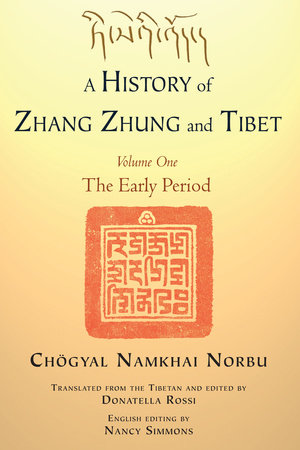
A History of Zhang Zhung and Tibet, Volume One
The Early Period
Chogyal Namkhai Norbu; Translated by Donatella Rossi; Edited by Donatella Rossi and Nancy Simmons
Paperback
May 14, 2013 | ISBN 9781583946107
AmazonBarnes & NobleBooks A MillionBookshop.orgHudson BooksellersPowell'sTargetWalmart
Ebook
May 14, 2013 | ISBN 9781583946268
AmazonApple BooksBarnes & NobleBooks A MillionGoogle Play StoreKobo
About the Book
Presenting the meticulous research of internationally known Dzogchen Buddhist teacher and scholar Chögyal Namkhai Norbu, the book investigates the mysteries of Zhang Zhung's Bon religion, a set of shamanistic and animistic beliefs and practices only recently studied by a handful of academic scholars. Offering a critical analysis of a vast array of literary and primary sources, Norbu discusses the role of the Bon traditions within Zhang Zhung's lineages, dynasties, and culture. Examining Zhang Zhung's written language, sacred ornaments, rock carvings, healing practices, music, and magical divination techniques, Norbu contributes to an understanding of the roots of Tibetan Buddhist culture and modern-day Bon religion--a practice followed by an estimated ten percent of Tibetans.
Table of Contents:
Translator's Foreword; A Technical Note about the Translation; I. The Human Generations of Ancient Zhang Zhung; II. The Bon Lineages of Ancient Zhang Zhung; III. The Royal Lineages of Ancient Zhang Zhung; IV. The Written Language of Ancient Zhang Zhung; V. The Civilization of Ancient Zhang Zhung; Indexes--Tibetan and Zhang Zhung Names and Terms, Textual Sources, Sanskrit Names and Terms, Chinese Names and Terms


